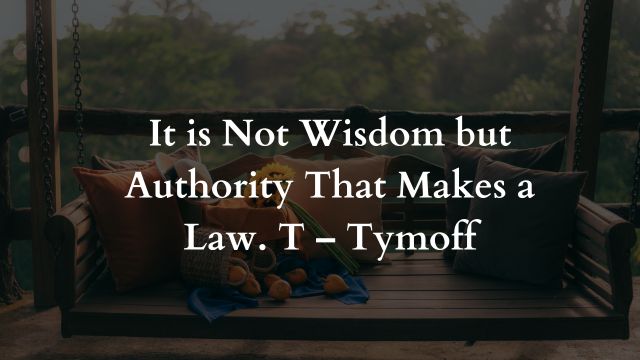The quote, “It is Not Wisdom but Authority That Makes a Law,” attributed to T-Tymoff, invites us to delve into the intricate relationship between wisdom and authority in the context of lawmaking. While the quote might sound controversial at first glance, it opens up a fascinating discussion about the role of both wisdom and authority in shaping our legal systems. In this article, we’ll explore this perspective in detail and consider its implications.
The Origin of the Quote
Before we dissect the quote itself, let’s take a moment to understand its origin. T-Tymoff, while not a household name like some famous philosophers or legal scholars, contributed thought-provoking ideas to the realm of jurisprudence. The quote, “It is Not Wisdom but Authority That Makes a Law,” is often attributed to him, and it challenges conventional thinking about the foundations of law.
The Duality of Wisdom and Authority
To grasp the essence of T-Tymoff’s perspective, it’s essential to dissect the duality of wisdom and authority and how they relate to the creation and enforcement of laws.
Wisdom in Law
Wisdom, in this context, represents the knowledge, insight, and rational thinking applied to the creation of laws. Wisdom implies a deep understanding of societal values, ethics, and human nature. It involves the careful consideration of consequences, fairness, and justice. Wisdom-driven lawmaking aims to create a legal framework that promotes the well-being and harmony of society.
When wisdom plays a central role in lawmaking, the resulting laws are often grounded in moral and ethical principles. They are designed to serve the greater good, protect individual rights, and ensure justice prevails.
Authority in Law
Authority, on the other hand, signifies the power vested in institutions, individuals, or entities to create, enforce, and interpret laws. This authority can be governmental, judicial, legislative, or even traditional, depending on the legal system in question. Authority is responsible for establishing the rules and regulations that govern a society.
Laws created through authority are binding, and non-compliance can lead to consequences such as fines, imprisonment, or other punitive measures. The authority behind lawmaking often stems from government bodies, which are typically granted their power through a constitution or democratic process.
The Intersection of Wisdom and Authority
T-Tymoff’s quote “It is Not Wisdom but Authority That Makes a Law. T – Tymoff” underscores a critical tension between wisdom and authority in the legal sphere. While wisdom suggests that laws should be guided by moral principles and ethical considerations, authority emphasizes the power to enforce and maintain order. These two elements sometimes converge harmoniously, but they can also clash.
When Wisdom and Authority Align
In an ideal legal system, wisdom and authority complement each other. Laws crafted with wisdom uphold justice, fairness, and societal welfare, and the authority ensures their implementation. In such cases, authority supports the application of just and ethical laws.
For instance, a legal system that prohibits discrimination and upholds equal rights is an example of wisdom and authority working in harmony. The law is guided by wisdom, as it promotes ethical values of fairness and equality, and the authority ensures that those who violate these principles face consequences.
When Wisdom and Authority Clash
However, there are instances when the pursuit of authority can overshadow wisdom, leading to laws that may lack moral or ethical grounding. In these cases, laws may be created or enforced for reasons other than promoting justice or societal well-being. Instead, they may serve the interests of those in power, perpetuating inequality or injustice.
An example of this can be seen in historical instances of discriminatory laws that were enforced by those in authority. These laws, such as segregation laws in the United States, were enacted and enforced with authority but lacked the wisdom of ethical considerations.
The Implications of T-Tymoff’s Perspective
T-Tymoff’s quote challenges us to reflect on the relationship between wisdom and authority in the legal context and its implications for society. Here are some key takeaways:
1. The Importance of Ethical Lawmaking
T-Tymoff’s perspective reminds us of the significance of ethical and wisdom-driven lawmaking. Laws that are grounded in moral principles and societal values are more likely to promote justice and social harmony.
2. The Role of Oversight and Accountability
To ensure that authority does not overshadow wisdom in lawmaking, there must be mechanisms of oversight and accountability. A system of checks and balances, along with transparency in government actions, can help prevent the misuse of authority.
3. The Need for Legal Reform
T-Tymoff’s perspective also raises questions about the need for legal reform when laws are found to lack wisdom or ethical grounding. Reevaluating and amending laws that do not serve the greater good is a vital aspect of a just legal system.
4. The Role of Civil Society
Civil society plays a crucial role in advocating for laws that reflect wisdom and ethical values. Citizen engagement, activism, and advocacy can influence both the creation and enforcement of laws.
In Conclusion
T-Tymoff’s quote, “It is Not Wisdom but Authority That Makes a Law,” invites us to critically examine the interplay between wisdom and authority in the realm of law. While both elements have their place, a balanced approach that prioritizes ethical considerations and societal welfare is essential for a just and equitable legal system. This perspective challenges us to strive for laws that not only have the power to enforce order but also the wisdom to uphold justice and fairness in society.
Read Also: Try Hard Wordle: How to Use the Try Hard Wordle Solver?

